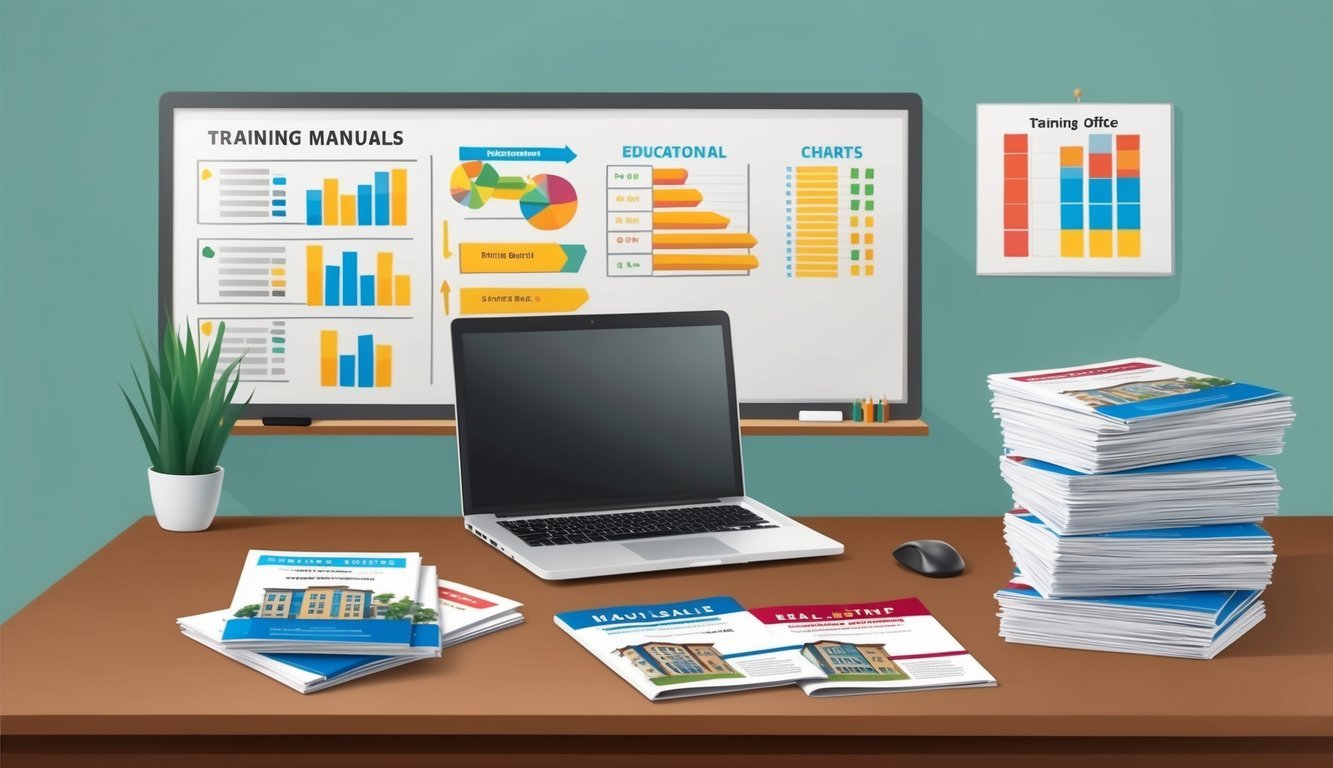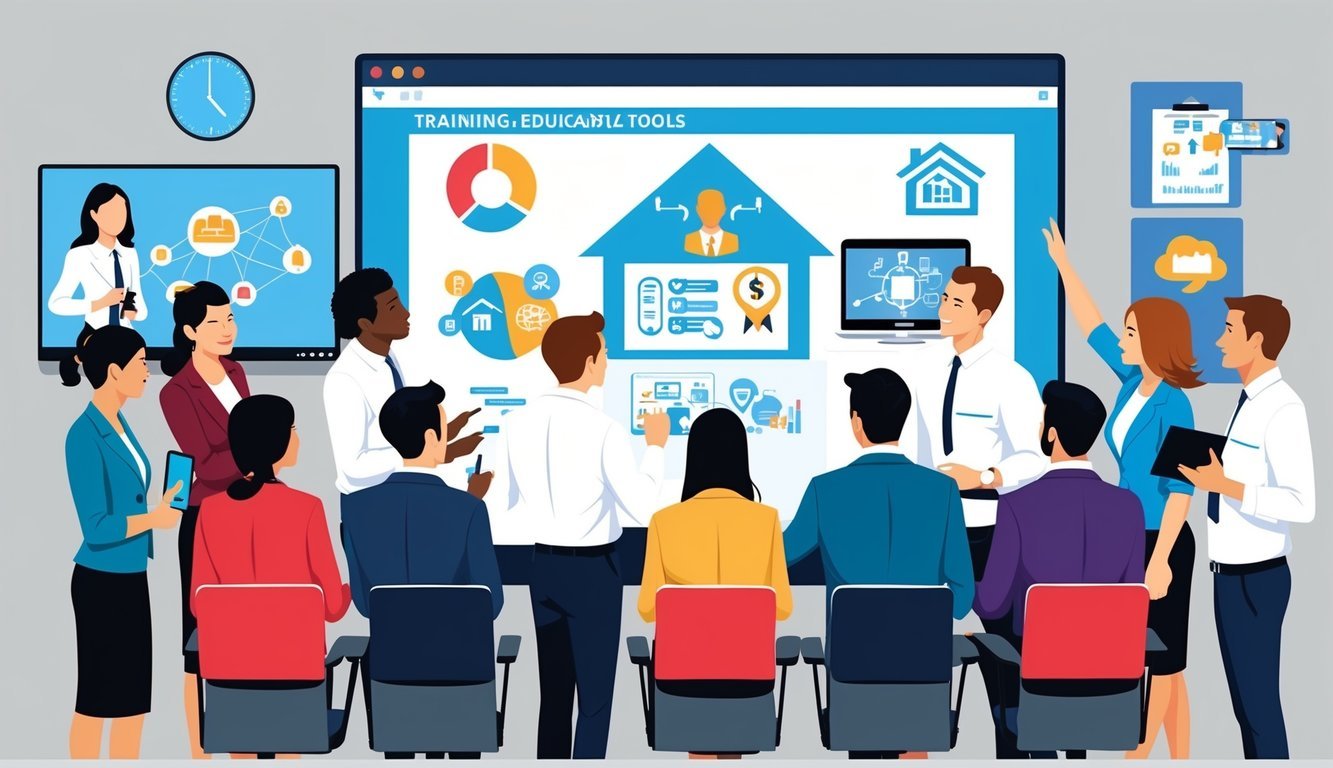In the ever-evolving real estate industry, realtors need to stay updated with the latest knowledge and skills.
Staying updated is crucial because realtors must navigate a competitive marketplace.
Leveraging the right educational tools can significantly enhance your career.
The digital age offers a myriad of resources designed to streamline learning.
These tools can also keep you at the forefront of industry trends.

Identifying the most effective training tools ensures you remain knowledgeable and capable of meeting client needs efficiently. These educational resources not only sharpen your skills but also boost your confidence by improving your familiarity with diverse aspects of real estate.
Embracing such tools can help foster professional growth and elevate your success in the industry.
1) Real Estate Express

Real Estate Express is a valuable educational platform for aspiring real estate professionals.
Founded in 1996, it offers comprehensive online courses that help you prepare for your real estate license exam.
Whether you’re new to the field or looking to refine your skills, this platform provides targeted learning resources.
With Real Estate Express, you have access to courses in 33 states.
This allows you to check and ensure the platform operates in your area before you commit.
The diverse range of courses means you can tailor your learning to meet state-specific requirements.
Colibri Real Estate powers Real Estate Express, which emphasizes bringing market-relevant content to students.
This ensures that you’re learning current information and best practices for practicing at the top of your license.
Accessing a variety of courses means you’re always improving your skills in an increasingly competitive workforce.
This platform operates entirely online and provides a flexible, secure learning environment.
If you’re considering a career in real estate, taking courses with Real Estate Express can be an excellent step forward.
The convenience of studying from home, combined with a robust curriculum, makes it easier to achieve your licensing goals.
2) The CE Shop
The CE Shop offers a streamlined approach to real estate education, providing resources for every stage of your career.
Whether you’re starting with Pre-Licensing, advancing with Post-Licensing, or maintaining your license with Continuing Education, this platform caters to all your needs.
You can enjoy the flexibility of online learning with The CE Shop.
Courses are designed to be both affordable and accessible, allowing you to learn at your own pace from anywhere.
This convenience is a significant advantage for busy professionals.
The platform also includes a feature called ProPath, which helps you distinguish yourself in the competitive real estate field.
By enhancing your skills and knowledge, you can stay ahead in your career.
If you require additional details or support, The CE Shop provides resources and answers.
It stands out for its comprehensive support, ensuring that you have the guidance needed for any questions about course content or technology.
For more, check out their Real Estate Classes Online.
3) RETI (Real Estate Technology Institute)

The Real Estate Technology Institute (RETI) serves as a vital resource for real estate professionals aiming to leverage technology in their business.
With a team of leading technology instructors, RETI provides comprehensive training and support to help you navigate the digital landscape effectively.
You can benefit from a variety of educational offerings, including webinars, courses, and tools tailored to enhance your technical skills.
These resources are designed to keep you updated with the latest advancements and best practices in the industry.
The mission of RETI is to empower realtors to elevate their business capabilities through targeted technology education.
Whether you are looking to boost communication efficiency or streamline business processes, RETI offers specific solutions to meet those needs.
Being part of RETI’s community grants you access to exclusive content and instructional materials.
You will find resources ranging from brand building strategies to digital marketing insights, all aimed at enhancing your professional growth.
Explore more about what RETI offers on the Real Estate Technology Institute website.
This platform is pivotal in helping you stay competitive and knowledgeable within the ever-evolving real estate market.
4) Kaplan Real Estate Education

Kaplan Real Estate Education offers various courses that equip you with essential skills for a successful real estate career.
Whether you’re preparing for your licensing exam or expanding your expertise, Kaplan provides resources tailored to different learning styles.
With flexible schedules, you can learn at your own pace and convenience.
Kaplan’s experienced instructors are dedicated to helping you pass your exams on the first attempt.
Their real-world knowledge provides valuable insights that go beyond textbook learning.
You’ll find comprehensive support for exam preparation, which is instrumental in building your confidence.
You can choose from state-approved courses covering a range of topics in real estate, contracting, and appraisal.
This variety ensures that you have the necessary qualifications to pursue diverse opportunities within the industry.
As you navigate your career path, Kaplan offers ongoing professional development and continuing education to keep your skills up to date.
This commitment to continuous learning is reflected in their community of dedicated professionals.
Engaging with this network not only helps you stay informed about industry trends but also cultivates connections that might benefit your career growth.
5) McKissock Learning

McKissock Learning is a premier educational platform designed for real estate professionals seeking to expand their knowledge and skills.
With a variety of courses tailored to meet the needs of real estate agents, it’s an excellent resource for ongoing education.
You’ll have access to over 250 courses that cover a wide range of topics.
Whether you’re a newcomer or a seasoned professional, McKissock offers courses that cater to your level of experience.
Real estate agents can benefit from their comprehensive coaching and training programs to help bolster career advancement.
The platform’s courses have received excellent feedback, with an average rating of 4.4 stars.
You can also take advantage of McKissock’s offerings in terms of qualifying education, continuing education, and professional development.
This makes it versatile in addressing different stages of your career as a realtor.
The accessibility of their learning tools is another highlight, as courses can be completed online at your pace.
Best Practices for Implementing Educational Tools

When considering educational tools for real estate training, it’s crucial to methodically assess your needs and review potential software solutions.
Focusing on these steps helps ensure successful integration of new tools into your workflow.
Identifying Your Training Needs
Begin by clearly defining the specific skills and knowledge gaps within your team.
Are your agents struggling with negotiation techniques or property valuation methods? Determining these areas will guide your search for the right educational resources.
Involve your team in this process to gain their insights and perspectives.
Conduct surveys or hold small group discussions to gather feedback.
This collaboration ensures the tools you choose will directly address your team’s requirements and foster greater engagement.
Identify any existing training resources that you currently employ.
Review their effectiveness and pinpoint areas for improvement.
This evaluation will help you avoid redundancy and focus on selecting tools that genuinely enhance your training arsenal.
Evaluating Software Options
Once you have pinpointed your training needs, focus on evaluating software options that align with these requirements.
Look for platforms that offer customizability, as every real estate team has unique strengths and weaknesses.
Consider features like mobile access, interactive content, and ease of use to ensure that the software is readily embraced by your team.
User reviews can be invaluable, highlighting practical advantages and potential drawbacks of each tool.
Review integration capabilities with your existing systems.
This compatibility ensures a seamless transition and prevents disruptions in daily operations.
Choosing the right software not only upgrades your training framework but also enhances your team’s professional growth and productivity.
Integrating Technology with Realtor Training

Incorporating technology into realtor training can greatly enhance learning experiences by making education more accessible and interactive.
Mobile learning solutions offer flexibility, while virtual reality provides immersive simulations.
Adopting Mobile Learning Solutions
Mobile learning solutions are transforming realtor training by enabling education anytime, anywhere.
With platforms like SC Training, you can access courses directly on your smartphone, making it easier to fit learning into your schedule.
This approach fosters a collaborative learning environment, where you can engage with peers and instructors in real-time.
By offering easily digestible content in smaller modules, mobile platforms cater to different learning styles and paces, allowing you to pause, rewind, and revisit important concepts whenever necessary.
Utilizing Virtual Reality for Simulations
Virtual reality (VR) adds a compelling component to realtor training by offering realistic simulations that enhance practical skills.
VR allows you to explore virtual properties, perfecting your negotiation skills and customer interactions in a risk-free setting.
The immersive nature of VR helps you develop a deeper understanding of property layouts, environments, and client needs without physical limitations.
By integrating VR into training, you gain firsthand experience with complex scenarios, ultimately boosting confidence and competence in real-world situations.
This technological advancement ensures that your learning is not only theoretical but also applicable in everyday professional contexts.
Measuring the Effectiveness of Training Tools

To ensure that real estate training tools are valuable and efficient, it’s crucial to focus on clear objectives and performance metrics.
These elements help assess how well these tools meet real estate professionals’ educational needs.
Setting Clear Objectives
When evaluating training tools, you must begin with specific, measurable objectives.
Define what you aim to achieve with each tool, whether it’s improving negotiation skills or enhancing market analysis abilities.
Clear objectives provide a foundation for measuring success.
For realtors, objectives might include mastering new software platforms or boosting lead conversion rates.
It’s important to align these objectives with broader business goals.
This alignment ensures that the training directly enhances performance and contributes to professional growth.
Consider using strategies such as the SMART criteria—Specific, Measurable, Achievable, Relevant, and Time-bound—to frame your objectives effectively.
By doing so, you create a structured environment that facilitates precise assessment.
Analyzing Performance Metrics
After setting objectives, the next step is to pinpoint relevant performance metrics.
These metrics will help gauge the impact of the training tools.
For instance, a tool designed to improve communication skills might be evaluated based on increased client engagement or smoother closing processes.
Select metrics that reflect both individual and team progress.
It can be helpful to compare pre- and post-training data to determine the extent of improvement.
Metrics such as sales numbers, client retention rates, and feedback scores are commonly used in real estate.
Consistent data analysis over time will offer insights into how effectively the tools enhance your capabilities.
Tools like dashboards and reporting software can simplify tracking these metrics, allowing you to make informed decisions about ongoing training investments.
Frequently Asked Questions

Understanding the required education, entry methods, and valuable qualifications is essential for success in real estate.
Incorporating the right certifications and software can significantly impact your efficiency and income potential.
What education is required to become a real estate agent?
To become a real estate agent, you typically need a high school diploma and must complete a pre-licensure course specific to your state.
Real Estate Express is a popular choice for fulfilling these educational requirements.
How can one become a real estate agent with no prior experience?
You can start a career as a real estate agent without prior experience by first completing the required pre-licensure course.
Many new agents gain initial experience at a brokerage, where they can learn from seasoned professionals and build their network and client base.
What are the best educational designations for a real estate professional?
Obtaining specific designations can enhance your expertise and credibility.
For example, the Certified International Property Specialist (CIPS) offers specialized knowledge in the global real estate market, which can be beneficial.
You can find insights into obtaining this designation from the National Association of REALTORS®.
Why is training crucial for professionals within the real estate industry?
Training is vital as it keeps you updated on industry trends, legal standards, and effective management practices.
Resources like Kaplan Real Estate Education and McKissock Learning offer courses that can elevate your skills and maintain your competitive edge.
Which certifications in the real estate field offer the highest financial returns?
Certifications such as the Certified Residential Specialist (CRS) and the Accredited Buyer’s Representative (ABR) are known for potentially increasing your earning potential.
These credentials are respected in the industry and signify a higher level of expertise.
What types of software tools are commonly used by realtors in their practice?
Realtors often use tools like CRM systems, marketing platforms, and transaction management software.
The Real Estate Technology Institute (RETI) provides resources on selecting and using technology effectively.
This can help you streamline your operations and enhance client service.

